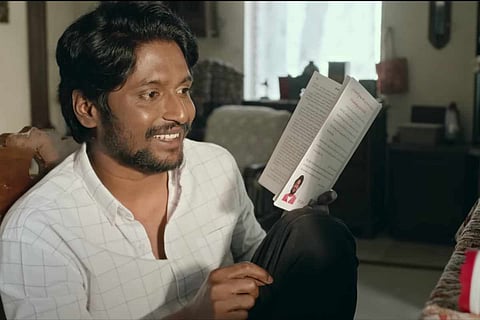

Written by: Balakrishna Ganeshan
Three years after the success of Colour Photo, actor Suhas is back on screen, this time as the main lead in Writer Padmabhushan. The plot revolves around an aspiring Telugu writer with high ambitions of succeeding in the literary world, and director Shanmukha Prasanth sets the film in Vijayawada, a city that is known for its literary culture. The film also stars actors Suhas and Tina Shilpa Raj who play important characters, as well as actors Rohini Molleti, Ashish Vidyarthi, and Gouri Priya in other significant roles.
Suhas, who essays the titular role of Padmabhushan, deliberately works as an Assistant Librarian, a job that allows him time to read and write. His only goal is to be recognised as a popular writer along with other Telugu greats. As outdated as the plot sounds, Shanmukha’s poor writing and lack of research add to the banality of the film. At no point does it feel that the film takes place in the present day. This is not to say that nobody today aspires to become an author, or that the book-reading culture has vanished completely, but the director does not incorporate any new ideas in the narrative that add freshness to the film.
In the opening sequence, while establishing the plot with visuals of the book stalls in Vijayawada, a background voice speaks about the literary culture of Vijayawada and says, “Google which place has the biggest book fair and pop comes the answer: Vijayawada.” I am inclined to believe that this is the only surface-level research that has gone into scripting Writer Padmabhushan.
Sample this: The entire film is about the main lead making efforts to become a great writer. But at no point does the story bother to explain why he wants to become a writer, and what kind of stories he desires to write.
In the film, Padmabhushan writes an unsuccessful book called ‘Tholi Adugu’ (The First Step) and publishes it on his own with the help of a bank loan. But the book tanks as nobody is interested in reading it, despite aggressive marketing strategies. We do not know the contents of the book or any other details about what it entails. Is he a bad writer? Is the story not engaging? There are no explanations. Only through another character do we get to know that the plot of this particular book does not follow a conventional narrative form.
Suhas delivers a decent performance as a struggling writer who is extremely awkward when forced to have a conversation with his fiance. Tina is also convincing in whatever she is supposed to perform. But with no strong point to anchor the story, the film goes for the lowest-hanging fruits. This becomes embarrassingly evident when the climax is revealed. Shanmukha tries to compensate for his sketchy writing with some pale humour and an ‘emotional’ twist at the end, along with a force-fitted “message”. By the time the climax unfolds, it becomes clear that Shanmuka banked on the climax as the trump card to make up for a poorly written film.
We are not sure if Padmabhushan becomes a successful writer or not. He just writes and publishes his second book as a tribute to his mother, and titles it ‘Amma Katha’ (Amma’s Story). So, there is no fulfilling climax either. Talking about the lives of women through a popular medium like cinema is impactful, but making an insincere attempt merely to mask the other flaws in the script is a disservice to the cause.
Writer Padmabhushan is nothing short of a ‘cringe’ video loaded with a “message”, like the reels one would encounter while scrolling through social media.
Disclaimer: This review was not paid for or commissioned by anyone associated with the film. Neither TNM nor any of its reviewers have any sort of business relationship with the film’s producers or any other members of its cast and crew.